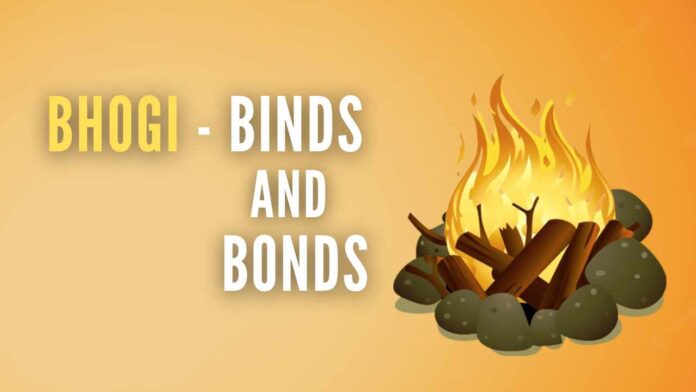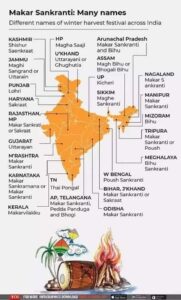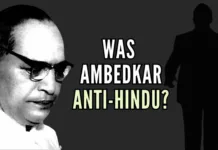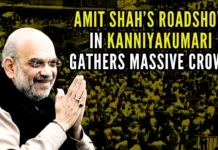
Need of the hour for us to come together to celebrate ‘Bhogi’
Festival seasons have always been great sources of joy and happiness. They thereby give us a welcome relief from monotony and act as stress busters. Bharat, since being an ancient civilization has a long list of festivals. We have festivals of various sizes that is, which are celebrated at the local level, the regional level, and the national level.
Today, we are going to look at a national-level festival (in fact, the starting day of the festival), that is Sankranti (known as Pongal in Tamil Nadu). Sankranti is celebrated for 3-4 days in various states. East to West and North to South.
Bhogi is the first day of Sankranti. The name means to consume, enjoy or experience. As the name indicates, it is a day of merry-making. It once again proves that Hinduism, unlike some religions, does not forbid enjoyment. Hinduism looks at life comprehensively and compositely, and hence joyous festival seasons bear approvals in the Vedas, Upanishads, two epics, and Puranas. At the same time, we must bear in our mind that festivals are not mere carnivals. Even while seeking pleasure, the Hindus are guided to adhere to Dharmic values. Thus, they are not days of the mere carnival but days to remember and express thanks to the God or Goddess. Bhogi is a shining example of that principle.
Bhogi precedes Sankranti, meaning a complete or total revolution. To bring a revolution, it is imperative to shed old practices and processes. How will you find a space for bringing in new goods or practices unless you get rid of redundant and unnecessary ones. This concept is depicted by the ritual of lighting a bonfire in the early hours of the Bhogi day. At the Bhogi fire, we throw old things, broken wooden furniture, worn and torn clothes, materials that are no more in use, etc.
Here, we must take cognizance of certain self-serving environmentalists (pseudo), who condemn the ritual of the Bhogi fire. While they stay deafeningly silent about burning millions of candles during et Christmas season, cry hoarse as the Bhogi approaches where fire burning is restricted to a few hours of one and only day. Look at their double standards. At the same time, we strongly condemn the burning of tires and plastic, which is mostly found in Tamil Nadu.
When we prepare for Bhogi-Sankranti, we must pause, take stock of our lives and identify unnecessary habits and complexes that have sneaked into our homes and hearts in recent times. We must jettison unwanted and harmful. When we want to climb a mountain, we have to discard old baggage mercilessly, isn’t it? This is very beautifully captured by my good friends, Mrs. Lavanya Ganesh and Ganesh, soft skills Trainers and Facilitators, whose website declares their motto as “Declutter to Develop“.
Once again, we must deal with the claims of certain divisive elements who propagate that Pongal (as Sankranti is called in Tamil Nadu) is a unique festival of Tamilians and it is celebrated in this State only. Their exclusivist contention is ludicrous, to say the least. Many of them lead a life that of ‘Frog in the Well ‘. They remain blissfully ignorant of the fact that Bhogi and Sankranti are celebrated from Nepal, Assam, and Maharashtra on the west coast down to Kanyakumari and again up to Bengal in the east. Names and forms may differ but the underlying spirit is the same. There are indeed common features in plenty and points of differences are a few. Let me quote just three common practices found in the Bhogi celebration.

First, is the Bhogi fire which we have seen earlier. The second one is that Bhogi is primarily a day of worship of Lord Indra, leader of thirty-three crores of celestial persons. Indra is held in high esteem both in Vedic literatures and Tamil literatures of Tolkappiam, Sangam literature like Pura Naanooru, to two of the five great epics namely Silappathikaaram, Manimekalai. Third, is the sweet dish prepared, namely Bholi which is similar to stuffed paratha.
Such individuals and political parties following divisive thoughts, use the hoary concept of Unity in Diversity as a cover to hide behind. Alas, they mouth that slogan and keep on harping and highlighting the differences only without caring to identify the unifying aspect.
Therefore, it is the need of the hour for us the nationalists to come together to celebrate Bhogi in a grand manner by throwing all the dirty ideas of division and destruction.
Note:
1. Text in Blue points to additional data on the topic.
2. The views expressed here are those of the author and do not necessarily represent or reflect the views of PGurus.
PGurus is now on Telegram. Click here to join our channel and stay updated with all the latest news and views
For all the latest updates, download PGurus App.
- Pandithurai Thevar – A poet, a patron and a protector - March 21, 2023
- Courage of conviction personified - February 20, 2023
- Bhogi – binds and bonds - January 14, 2023










